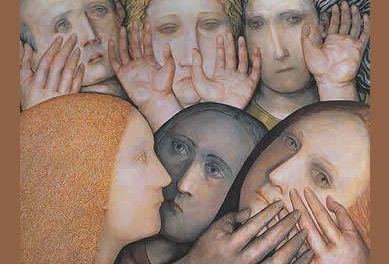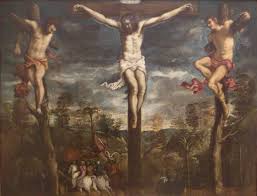(The following is a guest post from Dr. Holly Taylor-Coolman, who teaches at Providence College.) Last week, in the midst of ongoing, pre-election political debate, the Church quietly marked again the feast day of a remarkable saint: St. John Chrysostom, a theologian and famed preacher of the fourth century. The nickname Chrysostom itself means “golden tongue,” and refers to his remarkable rhetorical skills. If we assume, though, that his homilies must have been pleasant to hear, we may be in for a shock. Chrysostom was known for fearless denunciation of moral laxity on many topics, including one particularly relevant for many of us, especially those of us in more economically developed countries: wealth. For many of us, just reading these words quickly is enough to make us squirm.
“It is foolishness and a public madness to fill the cupboards with clothing and allow men who are created in God’s image and likeness to stand naked and trembling with cold, so that they can hardly hold themselves upright.
Yes, you say, he is cheating and he is only pretending to be weak and trembling. What! Do you not fear that lightning from Heaven will fall on you for this word? Indeed, forgive me, but I almost burst from anger.
Only see, you are large and fat, you hold drinking parties until late at night, and sleep in a warm, soft bed. And do you not think of how you must give an account of your misuse of the gifts of God?”
-St. John Chrysostom, 21st homily on 1 Corinthians
Now, at this moment, in a highly charged political atmosphere, it may be tempting to read this as a commentary on government policy. It certainly does suggest that the notion of the “undeserving poor,” currently once more at the center of political debate, has a long history. There is, however, another interpretive possibility that is even more unnerving. We might read it as Chrysostom preached it—as a word to Christian individuals and households.
The uncomfortable reality for many of us is that we have money to spare, and we make decisions in our own little economy every day. Would it be revealing too much to say that I myself have bought space-saving hangers so that I have room for my clothes in my closet, that my mattress has a lovely foam topper, or that I’m one of those folks always trying to figure out how to lose those extra twenty pounds? Would it sharpen the point to say that I am also well aware that in my own city of Providence, at least one in five children faces the threat of hunger?
Already, I know, some of us are stiffening in our seat. After all, we have to be realistic. We have to live. Some of my best friends have foam mattress toppers. Isn’t Chrysostom just falling into extremist rhetoric here? Does he want us to give away everything? Should we just live on the street and become one of the poor ourselves?
Unfortunately, the answer to these questions is the really bad news, and, it seems to me, precisely what we really don’t want to hear. St. Chrysostom is not St. Francis. He does not, in fact, give away all that he owns—or urge his listeners to do so. That would be easier to dismiss, or at least to relegate to a-much-larger-discussion-for-which-I-don’t-have-time-right-now. (It was a conversation, after all, that consumed a lot of time for a good number of serious thinkers, as they tried to discern what to make of “apostolic poverty” or the “counsels of perfection.”) That is not, however, the conversation that Chrysostom demands of us. Chrysostom doesn’t require that Christians give everything away. He just insists, with ferocity, that Christians give away every single drop of excess. Chrysostom’s requirement is not absolute poverty, but a trickier, sometimes more elusive, ideal: enough. Like St. John the Baptist before him, he allows us our first coat; it’s only the second that must go. Christians need not go naked; we just can’t fill our closets. He even allows us a glass a wine; it’s just those drinking parties that go late into the night.
So, what would it mean to take seriously the challenge that St. Chrysostom, speaking through the centuries, delivers? This, of course, is a large and ongoing conversation, but for now, I would suggest three theological categories that help.
First is the understanding of our lives as calling, or as “vocation.” The Second Vatican Council made clear that not just a few, but all, are called to lives of holiness, albeit in many different forms. As we decide how, when, and where to spend our money, we are not seeking some hypothetical golden mean between scarcity and luxury, but just enough for particular tasks: caring for our own needs and the needs of our immediate family and friends, offering hospitality to others, doing our day-to-day jobs. Balancing is not done in the abstract, but in the context of vocation, and we should not think primarily in terms of whether and how we will indulge or deny ourselves, but rather of the ways in which we can equip ourselves for the work we have to do.
Second is the fundamental notion of community. Whether together with those who belong to the Church, or in broader forms of human cooperation, we figure these things out best in conversation and in community. Consider the fact that questions of vocation posed above, still, allow for a wide variety of possible answers. I teach students, and I have to be well-rested, and, I’m telling you, I need that foam mattress topper. When we are left to our own devices, it is so easy to go astray. Happily, we are not left to our own devices. We are in this together, and we will do this best when we are working shoulder to shoulder, in a gentle algorithm of challenge, encouragement, and questioning. The Book of Acts describes brand-new Christians who actually pooled their money and resources. Surely, we can at least talk about them.
Finally, I would note the profound witness, especially for those of us living in in the midst of marked wealth, of the “fool.” Much better known to eastern Christians than to western ones, “holy fools” were infamous for their refusal to dress properly (or at all), for the appearance of insanity, and generally for disdain for convention. As we seek to re-shape our imaginations around money and its use, a “foolish” act, at least on occasion, might go a long way. As we talk sensibly about vocation, in our communal contexts, we might also, every once in a while, take the money we’ve saved for something special and give it away. We might donate not something old, but something new. We forgive the lovestruck young man who wastes his money on flowers. Maybe we could allow ourselves a bout or two of “wasteful” extravagance in giving.
This is a big conversation, but one well worth having, and conversation about our national economy and government policy, as important as it is, doesn’t take its place.




Thank you! This is fascinating and very helpful. It seems to me that most American Christians have a sex problem and a money problem. But whereas they normally are aware that the sex problem fits at best uncomfortably with the Gospels and Church Fathers, they seem blissfully unaware that the way they think of money is a problem at all.
My worry with this piece, is that it starts off with the wonderful 4th century language, but by the end has slipped into something that is something we don’t really mind hearing after all: “every once in a while, take the money we’ve saved for something special and give it away” “*Maybe* we could allow ourselves a bout or two of “wasteful” extravagance in giving”.
But while these likely suggest an incremental move in the right direction, they seem to me altogether not radical enough to fit with Chrysostom’s language. The casual reader, I think, would be forgiven for thinking that what Chrysostom may have applied back then, but now it is more like “keep 5 coats and maybe think about giving up your 6th.” There certainly is room for a discussion about what is “excess”. But because people want to justify their own luxuries, it seems to me that it should be made clear that the call to holiness is a radical call and that it demands what may seem like radical things.
RPRITCHIE, Thanks for this comment. In a sense, you’re offering a form of the communal discernment that I think is crucial. Let me say just a bit more about what I have in mind. When I mention saving for something “special,” I am imagining something that one might well discern, in a communal context, to be good and worth spending money on: a college education, a single, well-made pair of shoes with which to begin a new job, a cake to celebrate someone’s birthday. I intended to say in that my third point that, even in cases when we have carefully discerned that it is possible to spend money in ways that embody real goods, nevertheless we might occasionally do without even these.
I really loved this post, most thought provoking. There is not a lot that I can add in a comment here, but I did want to let you know that this left such a deep impression upon me. I wish that I had better words, but no “golden tongue” for me!